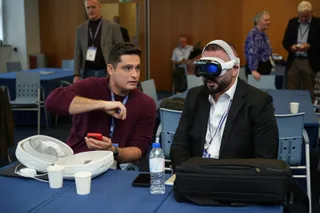More Airports, Airlines Implementing Virus Testing
Contact Our Team
For more information about how Halldale can add value to your marketing and promotional campaigns or to discuss event exhibitor and sponsorship opportunities, contact our team to find out more
The Americas -
holly.foster@halldale.com
Rest of World -
jeremy@halldale.com

In their attempts to weed out passengers infected with the Covid-19 virus, more airports and airlines are implementing tests, temperature checks, and even dog-sniffers to identify flyers who should be denied departure boarding or quarantined on arrival.
A prime example is Frankfurt Airport, which together with Lufthansa, the German Red Cross and rare disease research company Centogene has established the first walk-in Covid testing facility in Germany. A Centogene representative told CAT they are currently conducting about 3,500 to 4,000 tests per day, with more than 50,000 tests since the facility opened in late June.
The SARS-CoV-2 RT-PCR (Reverse Transcription Polymerase Chain Reaction) test detects whether an acute infection with the virus is present. It has received Emergency Use Authorization by the US Food and Drug Administration.
If you are scheduled to depart on a flight from Frankfurt, there are two options after registering on the Centogene website:
- An Express Test, delivering results within 3-4 hours (€139, or about $165 US)
- The Standard Test, 6-8 hours, (€59, or $70 US) – suggest registering the day before.
You can also order a test from Centogene via Amazon.
"The waiting times vary a lot and depend on air traffic (e.g. a plane from an at-risk country has landed)," the company told CAT. The registration and the test smear itself can be done within a few minutes.
For an additional charge €9 ($10.66 US), you can obtain an official, internationally valid attestation of the (negative) test result for submittal to the authorities in many countries. The results can be provided in German, English, Spanish, French, Dutch, or Chinese.
All results are delivered to the passenger via a secure digital platform. Your identification details, including your passport number and travel document details, will be included on the medical report – verifying that the test results belong to you and have not been tampered with.
Travellers are advised to plan to secure their test result an hour or more before airline check-in begins.
For incoming passengers from high-risk areas, Germany is mandating tests (also via Centogene in Frankfurt, and close by the paid test for outbound pax) but these are free of charge. The obligatory test must be done within the designated timeframe (24 hours, according to one passenger) after entering the country; failure to comply could bring a fine. Tests from abroad are accepted, provided they are not older than 48 hours at the time of arrival and meet the official requirements of the Robert Koch Institute, Germany’s public health authority.
In addition to a negative test result, some states in Germany also require a medical certificate, issued by a doctor, on the health status of the traveller.
Europeans Embracing Swabs
Germany, France, and Iceland were among the first countries to announce Covid-19 testing for passengers in their airports.
Widespread airport testing in France became operational across the country this month. All passengers arriving from high-risk, red-listed countries, such as Brazil, Israel, Serbia, South Africa, Turkey, the United Kingdom and the United States, will be subject to a PCR test. Affected passengers can take a virus test in their own country and present a certificate at the airport, or take a compulsory test upon arrival in France.
There’s no charge for the test; results are anticipated within 48 hours, and passengers are advised to self-isolate until they receive their results. Those who test positive are subject to standard 14-day quarantine rules.
In mid-June, Iceland began offering passengers an either/or: take a Covid-19 test upon arrival, or quarantine for a fortnight. Cost of the test is 11,000 Icelandic Krona ($81, €68), or 9,000 Icelandic Krona ($67, €56) if paid in advance.
On-site testing is available at Keflavik Airport through biopharmaceutical company deCODE genetics, but those arriving via Reykjavik, Akureyri and Egilsstadir will need to be tested at a local healthcare centre. Visitors are also being asked to download a government contact tracing app (Rakning C-19).
Moscow’s Sheremetyevo Airport launched a testing pilot project in late July, but only for domestic flights initially.
The Centogene test centres are located in the passage between Terminal 1 and the office building "The Squaire" at Frankfurt airport. Image credit: Walter Ullrich
UK, US, China – No Tests Yet
The UK’s Heathrow Airport, whose traffic is down 89% from a year ago, together with British Airways, easyJet, and other airlines and airports, petitioned Boris Johnson‘s government to allow testing. Heathrow CEO John Holland-Kaye said the 14-day quarantine policy "continues to strangle the UK economy." Heathrow has suggested it could have testing measures in place by early September, but ministers have rejected pleas to introduce tests at airports, claiming that a mandatory self-isolation for arrivals from higher-risk countries is a better way to prevent the virus spread.
Under Heathrow’s proposed programme, passengers would be expected to pay for the £150 (US$ 196, €166) test.
In the United States, in addition to restrictions on international travellers, some states such as New York are imposing mandatory quarantines for non-residents who arrive by car, bus, train, motorcycle, bicycle or foot.
Alaska is the only state to have begun testing air travel passengers, but only residents may receive the test at the airport. As of last week (11 August), non-Alaskans must provide evidence of a negative test before arriving.
The CEOs of American Airlines, United, and others in the US airline industry have urged the federal government to authorise a pilot programme for testing.
China has also not allowed testing in its airports. Rather, pax (residents or foreigners) are required to provide evidence of a negative test result, within five days before departure, at a facility designated by Chinese embassies – before emplaning a flight to China.
Scanners, Chambers and Canines
Another herd-sorting approach is thermal scanners, though experts (including the World Health Organisation), advise such devices will not detect asymptomatic individuals who have Covid-19 but who have not yet developed a fever.
JFK Airport in New York City is trialling thermal imaging technology to screen departing passengers who have a body temperature reading above 100.4 degrees F.
US Representative Ralph Norman and 12 bipartisan co-sponsors have proposed the Healthy Skies Act (HR 7651), by which the Transportation Security Administration (TSA) would identify at least 10 domestic airports for a limited experimental study.
"An interconnected nation like ours cannot stand still," wrote Norman in an op-ed. "Nowhere is this more obvious than in the airline industry. When people cannot move efficiently, it spills over to all sectors of our economy. When commercial aircraft are not flying, our economy is dying."
"To get our nation back on its feet, we must get back in the air," the Congressman emphasised.
In Paris, Charles de Gaulle and Orly airports have installed discreet thermal cameras in the luggage areas to screen passengers arriving on both domestic and international flights. If your temperature is above 38C (100.4F), you will be "invited" to proceed to a second temperature check with a contact-less thermometer. If confirmed a second time, you will be referred for a medical visit.
A proposed new device called Symptom Sense, which works like a walk-through metal-detector gate, gathers a passenger’s temperature, blood-oxygen levels, heart rate, and respiration rates. "We’re basically emulating a doctor’s visit," said Derek Peterson, the CEO of Soter Technologies. "You want to build a layered approach to find out if someone is well or not well."
At Hong Kong International Airport, travellers enter an airlock-type capsule which performs a 40-second treatment with something called nanometre-size needles, photocatalyst technology, and a sanitizing spray; airport spokespeople say it may be in widespread use by 2021.
In Dubai, the K9 unit of the police force has been trained to sniff out the coronavirus (but not the travellers directly). Samples taken in collaboration with the Dubai Health Authority are placed in a secure room with the dogs. If a sample sniffs positive, the dog will sit in front of it. Apparently, the dogs can detect possible infection within seconds. Officials report more than 90% accuracy.
Dogs at France’s National Veterinary School of Alfort have also been training to sniff out traces of the virus. When introduced to a line of sweat samples, most dogs were reportedly able to detect a positive with 100% accuracy.


